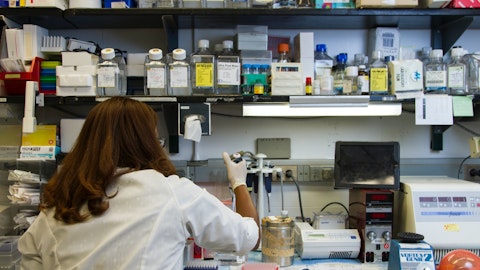Jan Mikkelsen: You are right. The European and the international market as we call it is what we call much more diverse way of reimbursement. The fastest one is Germany where already from January where we expect to launch TransCon PSA will be fully reimbursed. The patient population in Germany is actually pretty large compared to the size of the country, mainly driven by and higher treatment on head and neck operations. So you are right, it is a post surgical patient that is much higher. And we believe the addressable element of patient not the total patient population is about 22,000. At the same time, we are in a position where the only approved treatment for Hypopara in Germany is being taken away from the market. So we are in an intensive discussion with all the key centers how we really can help more than the 400 patients that basically already eyes that this on the PTH treatment, how to take one on treatment in 2024?
Besides that, for many years, there have been a long, long layout of patients that want to be on a PTH treatment but never had the opportunity to do it. And this is why the European approval give us a fingerprint starting immediately on a full blown commercial effort in Germany. At the same time, European or EC approval give us the opportunity to go to a named patient program and addressing more than the 400 plus NATPARA patients that still is in all European countries, which we feel a huge responsibility for also helping and also the patient that didn’t come into any treatment in the last nine-years. Rest of EU will take 12 to 24-months to be fully reimbursed, fully running commercial perspective. At the same time, the EU approval, which we expect to get here in the coming week will provide us with an approval system for addressing patients in the international market.
Some markets, we will have an independent application. Other market, we can directly refer into our European application. So we are dedicated really to help patients everywhere in the world, which have a need for the treatment because of the Hypopara patient situation that exists today.
Paul Choi: And just as a quick follow-up, with competing hGH products approved here in the U.S. Can you maybe just comment on maybe what mix of formulary access might be up for renegotiation this year? And any general comments you’ve had into the 2024 renegotiation period?
Jan Mikkelsen: I’ve been asked in the last 3, 4 months a lot. What is really the impact on having to our long-acting product in the U.S. market. And clearly, we never have seen more interest, we have not seen better numbers ever since it got clear with really best-in-class property SKYTROFA has compared to the other products, really building up on what we have established in the last two-years, how we really are changing the treatment we see in treatment of pediatric growth hormone deficient with a better outcome. And that is not going to change with any other long-acting. Basic is just providing, I believe for some of them and lower far to exceed and overcome compared to for example medical exception.
Operator: The next question comes from Joseph Schwartz with Leerink Partners.
Joseph Schwartz: So a couple of questions on TransCon CNP, if I could. First of all, I was intrigued by your commentary about achondroplasia being not only a bone disease but having a muscle component. And I was curious if you could just talk a bit about how you intend to illustrate the benefit of TransCon CNP on those aspects of the disease? And then also, in terms of, TransCon CNP’s potential comp to be combined with TransCon or SKYTROFA rather, as it is now called. I was wondering given I thought a lot of the earlier science suggested that growth hormone supplementation in achondroplasia had just an ephemeral benefit. What are your thoughts on the potential for the combination to show a more sustained response in achondroplasia?


